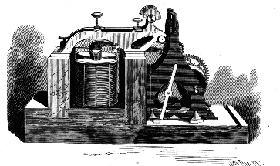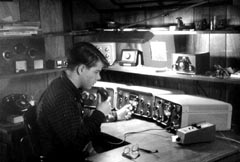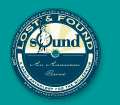|
The Telegraph
Listen to the entire program with RealAudio in 14.4, 28.8, or G2 SureStream.

The first Morse Code telegraph receiver of 1844. Now it's just about extinct. Photo courtesy of The Horn Speaker
|
The words "What hath God wrought!" resound in our ears as the world famous
message sent via the telegraph. Dots and dashes communicated between the
U.S. Capitol in Washington and Mount Clare Depot in Baltimore May 28,
1844. Now the medium is all but gone.
Ode to the Code
Produced by Jonathan Kern
Listen with RealAudio in 14.4 or 28.8 flavors. (2:20)
 Jonathan Kern, age 15. Courtesy Jonathan Kern.
Jonathan Kern, age 15. Courtesy Jonathan Kern.
|
All Things Considered editor Jonathan Kern recalls how the telegraph and
its Morse Code were an important part of his childhood -- a language that
united him with his father.
The Tale of Two Twitching Fingers
Produced by Gregory Whitehead
Listen with RealAudio in 14.4 or 28.8 flavors. (6:00)
The Tale of the Two Twitching Fingers - In the 1930s and through the mid
'40s, Western Union telegraph operator Alexander Shannon tapped away,
transmitting news of Boston's sports teams to news wires, and on to people
across America. While his work for Western Union was tumultuous, his
arrival
at home afterwards could be downright unpleasant - his wife Helene was a
huge Red Sox fan. Each night of a Red Sox loss, Alexander Shannon faced an
unsettling dilemma: tell the truth about the game and risk upsetting
Helene,
or tell a lie to avoid trouble.
Producer Gregory Whitehead traces the career of his grandfather, Alexander
Shannon, and the love of the Red Sox so prominent in his grandmother's
life.
Along the way, he chronicles telegraphy's remarkable impact on the way we
have communicated throughout the 20th century.
You need the free RealAudio player to listen to audio files.
Copyright © 1999 The Kitchen Sisters
|

